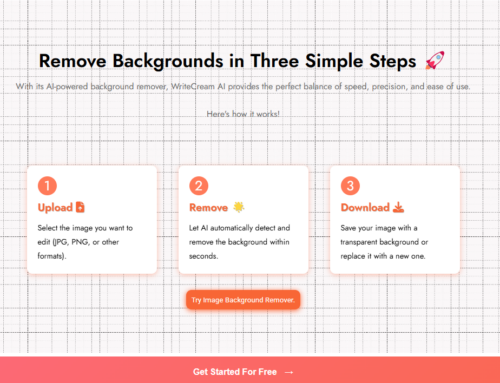
INTRODUCTION
With all of the development tools out there, it can be tough to figure out their differences. Well, don’t you worry because after reading this guide you’ll know everything you need to know to figure out which no code options are going to suit your developing needs best. We’ve got tools for everything from social media, to conversion, to marketing automation. All you need to do is sign up and in seconds, you’ll have them all set up. You’ll have all the tools you need to get the job done.
No code tools are awesome! No code tools allow you to save money, manage your tasks and give you back more of your working time. No code tools can be added via an API and can be programmed to be fully automated.
Let’s take a look at 20 no code tools to get your day started!
1. Landen
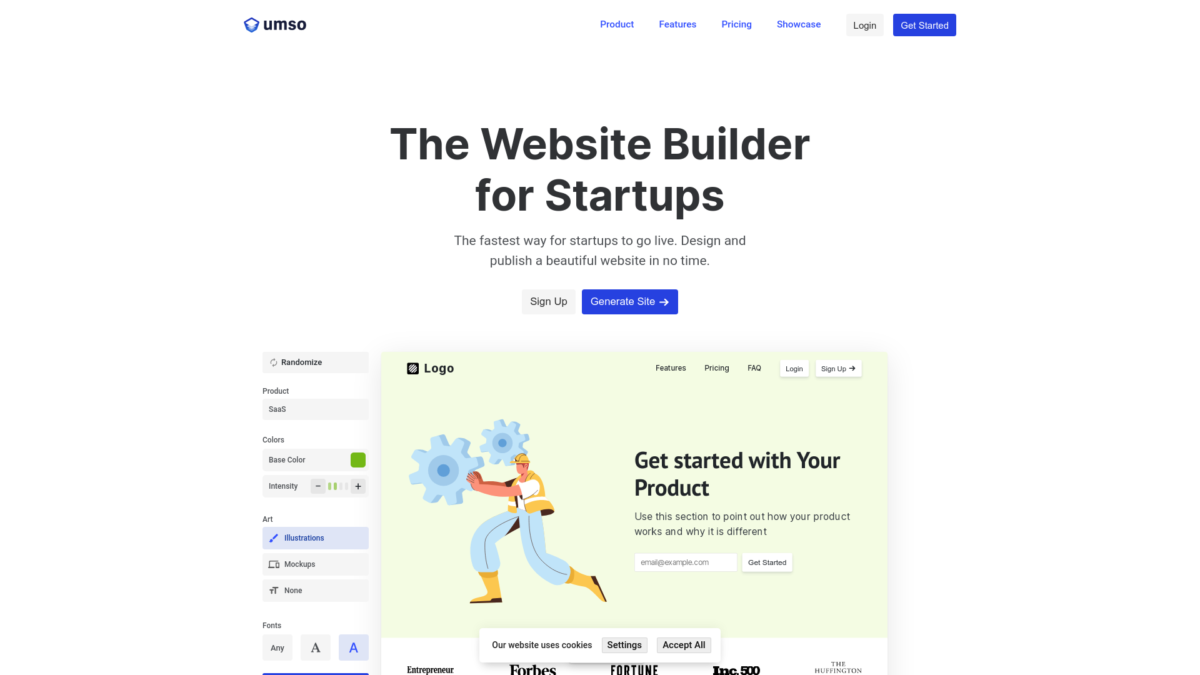
Landen is one of the best choices for business owners looking to get a professional and high-quality website up in a short amount of time. Not only does it offer complete customization, but you will also be able to create your own unique design by choosing from a variety of available templates. Doing so can help you save money on web development fees since there’s no need for custom coding.
Originally developed by Adyen, landen is a powerful landing page creation tool that allows users to create and preview responsive HTML5 templates in less than 60 seconds. The goal of this software is to remove the tedious task of creating web content from the equation, so you can focus on other important tasks such as design, research and marketing.
Why we like Landen:
Landen is a great option for anyone who needs a website quickly. You can tweak it to your liking but if you don’t have the time to invest then this one gives you the problem of making it unique and with style by creating your own background and adding on somewhere over 5 different add-ons which really do add a lot to the overall appearance of the site! The best part about this one is that it won’t cost you an arm, leg or big hunk of inheritance. It’s cost effective.
2. Gumroad

Not only are today’s technology startups attempting to determine the next big thing, other digital natives and value-based enterprises are looking at ways of allowing digital goods to be exchanged seamlessly and immediately through technology. And yet digital goods available in applications can only be purchased by credit card, PayPal and others who monopolize user payment processing data. What if there was a decentralized blockchain solution?
With such a platform, creators who don’t have their own e-commerce websites or don’t use platforms like Shopify or Squarespace could sell items with no worries about payment processing options; users would benefit from the security of using the blockchain for complete transaction transparency and lower fees compared to existing systems.
You can do this now thanks to Gumroad.
Gumroad is an e-commerce tool that makes it easy for creators of all different kinds to sell their work independently from a central site – no setup or coding necessary. You’ll pay an upfront $10 processing fee, and then receive a full 50% of every sale you make. People are using Gumroad to share songs, comics, novels and games with their fans and receive ongoing revenue for it.
Why we like Gumroad:
One reason why we love Gumroad is because it’s easy to implement. It’s a simple way for you to accept payments and work with your consumers, as well as a great option for creators–especially if you’re an emerging artist or someone who’s trying to build your audience. Another reason I’d like to highlight is that Gumroad is available anywhere in the world – everyone has access to this payment solution. As an entrepreneur, I know how important it is to be there for your customers wherever they are around the globe – especially considering that 80% of products purchased through Gumroad originate outside of the United States!
3. Webflow
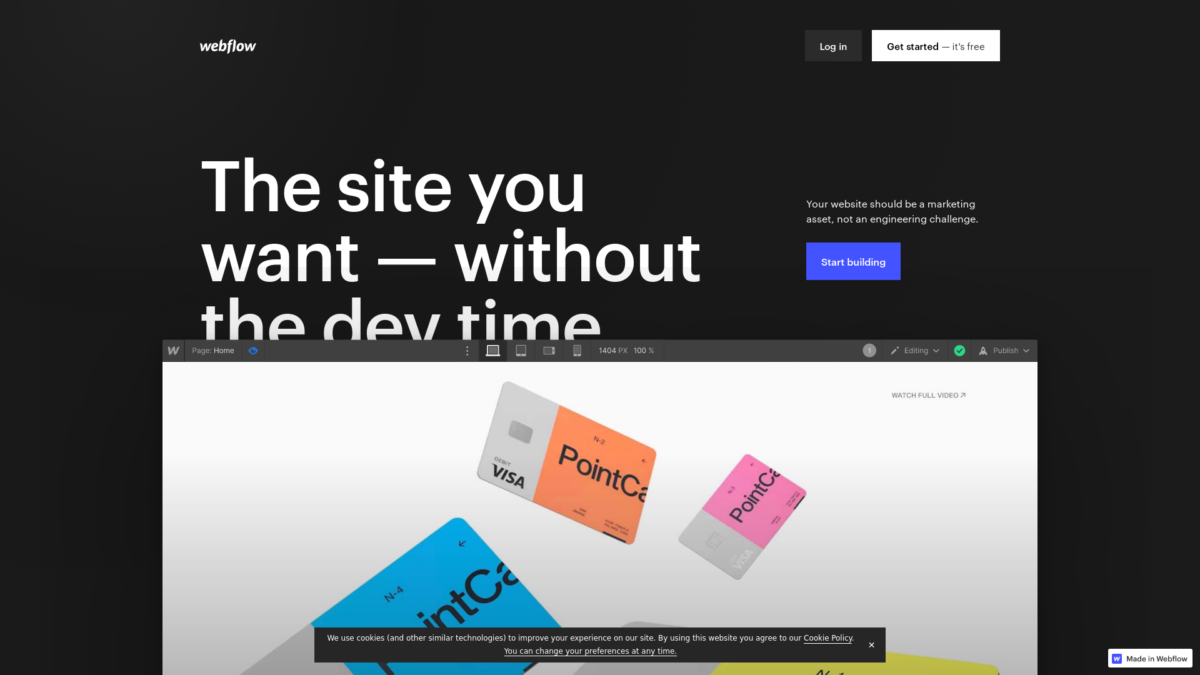
Webflow’s user-friendly interface makes website creation a breeze, which is especially beneficial for enterprises seeking efficiency in their online presence. For companies like Cenario, considering a dedicated webflow agency for enterprises can ensure not just mobile-friendliness, but also tailored solutions and ongoing support for optimal performance.
Webflow is a fantastic product that allows users to build beautiful and responsive websites with minimal effort (and absolutely zero coding required considering it provides pre-built templates/templating options). A few minutes hussle to get started and even if you’re new to web design, you’ll be able to learn the basics within just a few hours. Their website builder software allows you to create with endless possibilities either by downloading one of their impressive pre-defined templates or building something from scratch that matches your exact specifications from professional mockups made in tools like Sketch or Figma. If you are passionate about design and want a real challenge then this platform will serve as awesome masterclass for creating innovative ideas.
Why we like Weblow:
Weblow allows us to create web applications quicker than ever before. We can get a functional prototype online in record time and with their extensive library of available templates we don’t need to spend endless hours trying things out by ourselves. Weblow has changed our development process in drastic ways.
4. Parabola
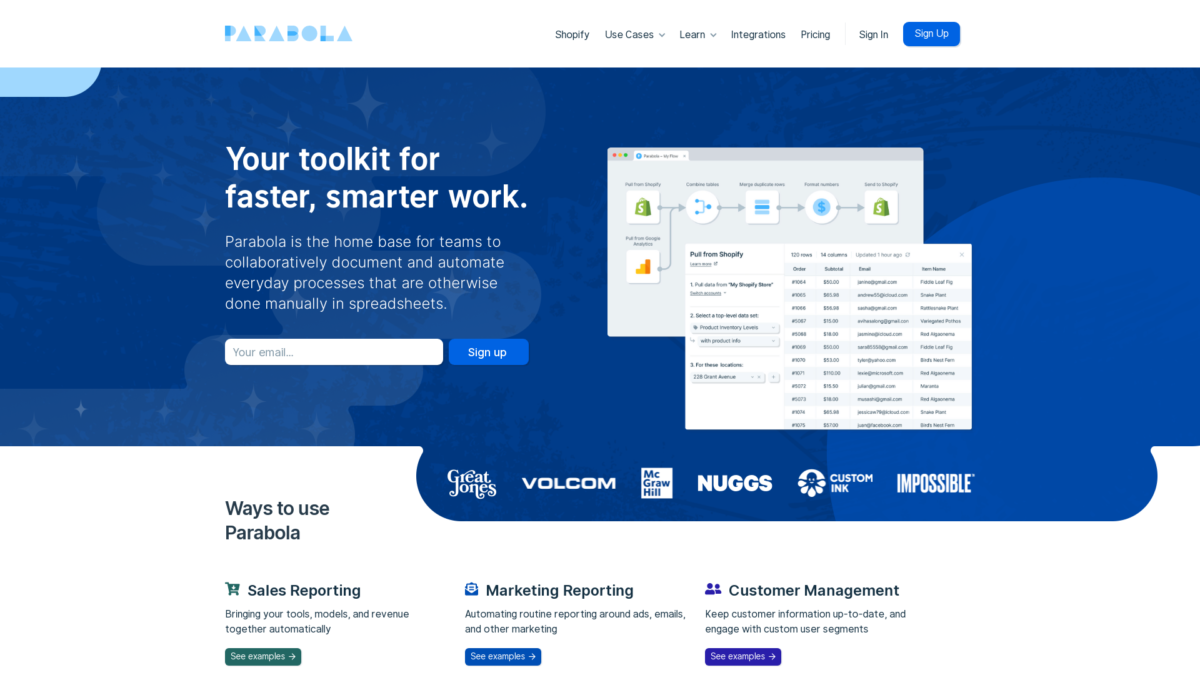
This is an app I recently discovered and I absolutely adore it! One of the most troublesome, although rewarding jobs one could have, is that of a developer. Sometimes the work they do can be quite difficult and frustrating. But they are also very important in keeping your company alive. Integrating one app to another can be a highly challenging endeavor, especially if you are trying to synchronize two incompatible programs.
At the core of every business is something called a workflow. A workflow basically dictates how tasks get handled within your organization. If you’re already utilizing an advanced CRM tool, scheduling certain types of emails, or trying to make sure your company’s metrics are in check, it might be time to start thinking about implementing a workflow automation platform into your business structure!
Parabola is an intuitive yet feature-rich builder that provides a wide array of automation options ranging from CRM processes to marketing tasks, email campaigns to metrics reports, and much more. It’s easy to get started on Parabola as it offers clear instructions on how to develop the creations you want on their resource page!
Why we like Parabola:
Works on most platforms
Convenient to use
Awesome ‘recipes’ to choose from
5. Memberspace
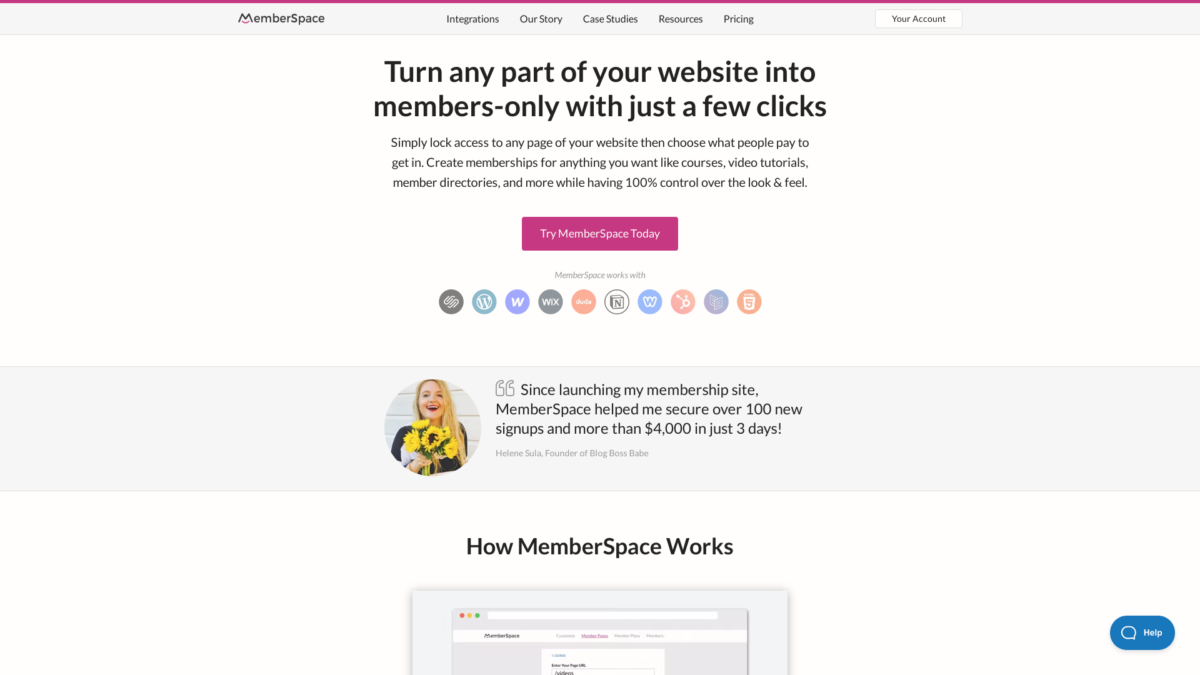
If you’re looking to set up a membership website, then MemberSpace is the best option. This platform makes it incredibly easy for businesses to generate revenue from memberships; your users won’t have any problems getting started with MemberSpace even if they’re not tech-savvy, and the integration process is easy too.
Members of your site can use the management console—also provided with the platform—to update their own account details or add content to their page, and edit any other aspect of their page as wished. MemberSpace runs on its own servers, so you don’t need to host anything yourself; you get complete control over your designs and can also modify them to suit your needs. You also get free migration services if you choose to make changes or switch platforms later on.
At webflow they’re working on an extensive collection of features and themes to help push the limits of what’s possible in a CMS. In order (to) make it fast, friendly and easy for anyone (to create a site)with no coding, we made sure that our writing was clear and conversational.
6. Airtable
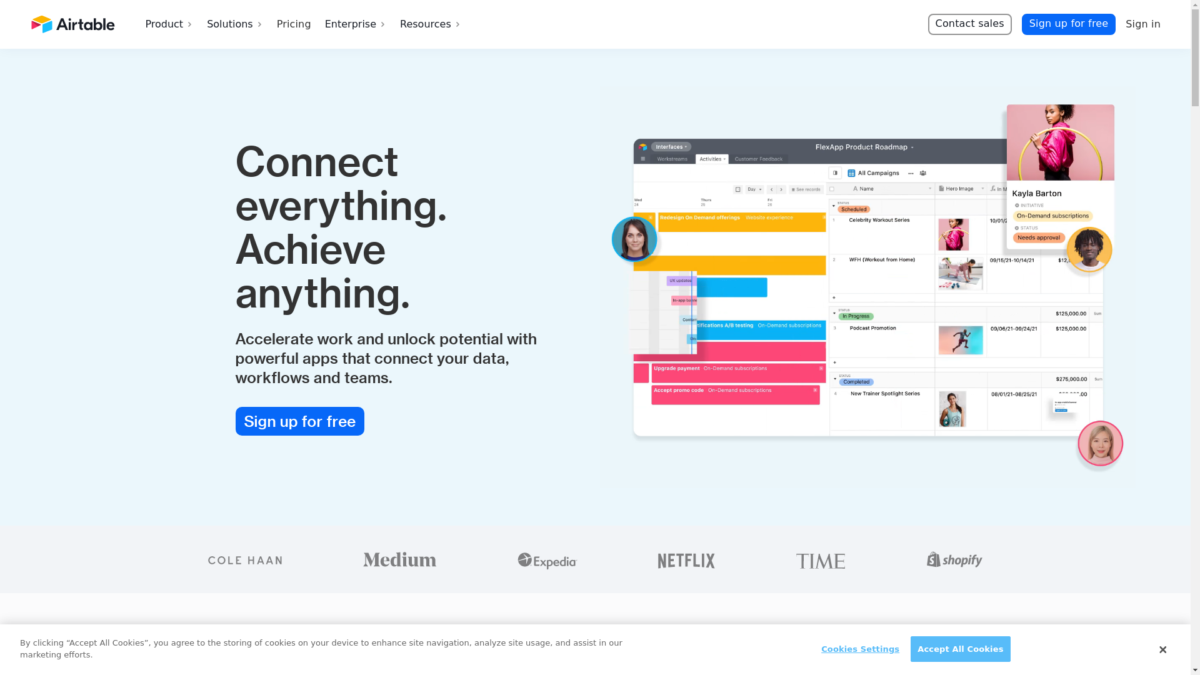
Airtable is an incredibly versatile software. Because of this, it lends itself for a variety of uses, such as CRM/CMS backends to websites and as information management systems. Airtable has an abundance of use cases and templates on their website.
Although the scope of what you could use it for is so large that it’s difficult to know where to start, here are just a few: using Airtable as a customer relationship tracking system with its CRM features; using it as the backend to your website’s CMS; using user research data collection templates; using content management templates and more!
Why we love Airtable:
Airtable is a powerful and helpful tool for both novices and experienced users alike, and it can be used in so many different ways! One of our favorite features is the Custom Fields which empowers you to categorize each item however you choose whether that means organising your contact list or inventory. Airtable also has a decent freemium package per user but it’s affordable to upgrade to their premium option should your needs grow beyond what the basic package offers.
7. Adalo
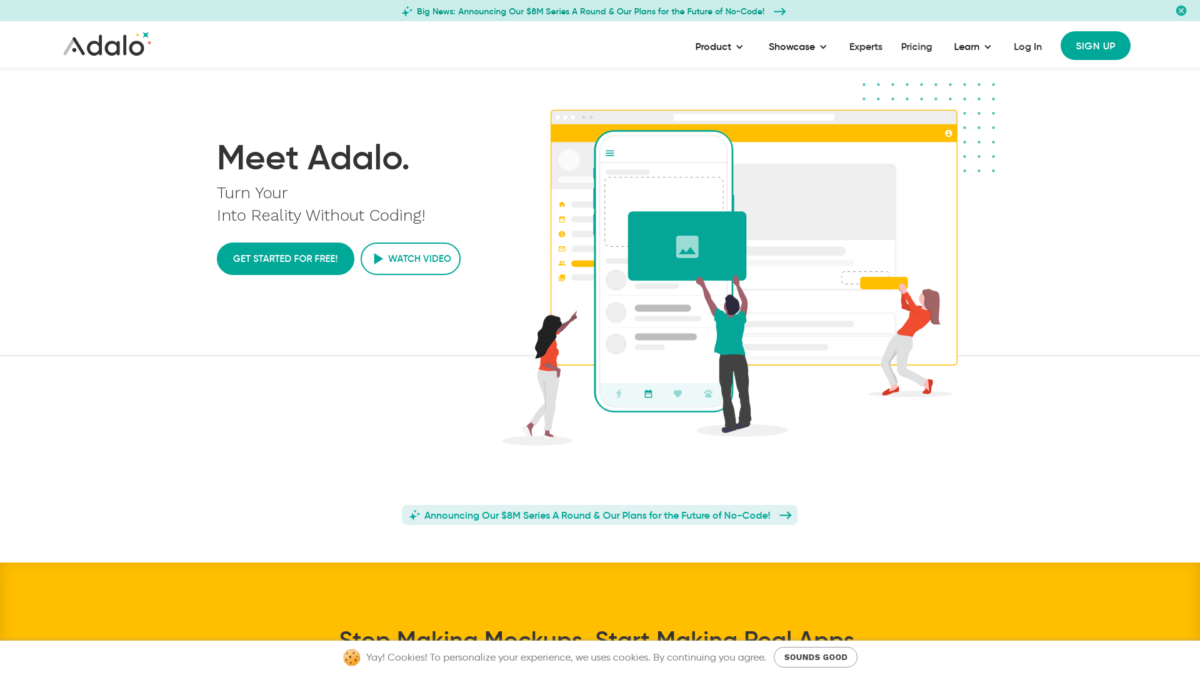
The Adalo platform is a particularly attractive option for beginners to coding, but it also serves as an excellent tool even for more experienced developers who want to design or modify mobile apps with ease and some particular functionalities. The online tools it provides simply allow you to build the structure of an application by dragging elements directly from a library (e.g. maps, buttons) to the desired section of your screen, thus avoiding common errors usually made during traditional codification processes that, on top of being time-consuming, are not always compatible with all devices and most importantly do not produce native code.
The best part is that users can build their app from within their browser allowing them to see exactly what they have created in real-time meaning that corrections and alterations can be made easily before publishing onto the app stores!
Well constructed and easy to use, the Tutorials app development company have been able to produce a beautiful looking, simple to follow design so that you do not have to waste time finding your way around on your own!
8. Notion
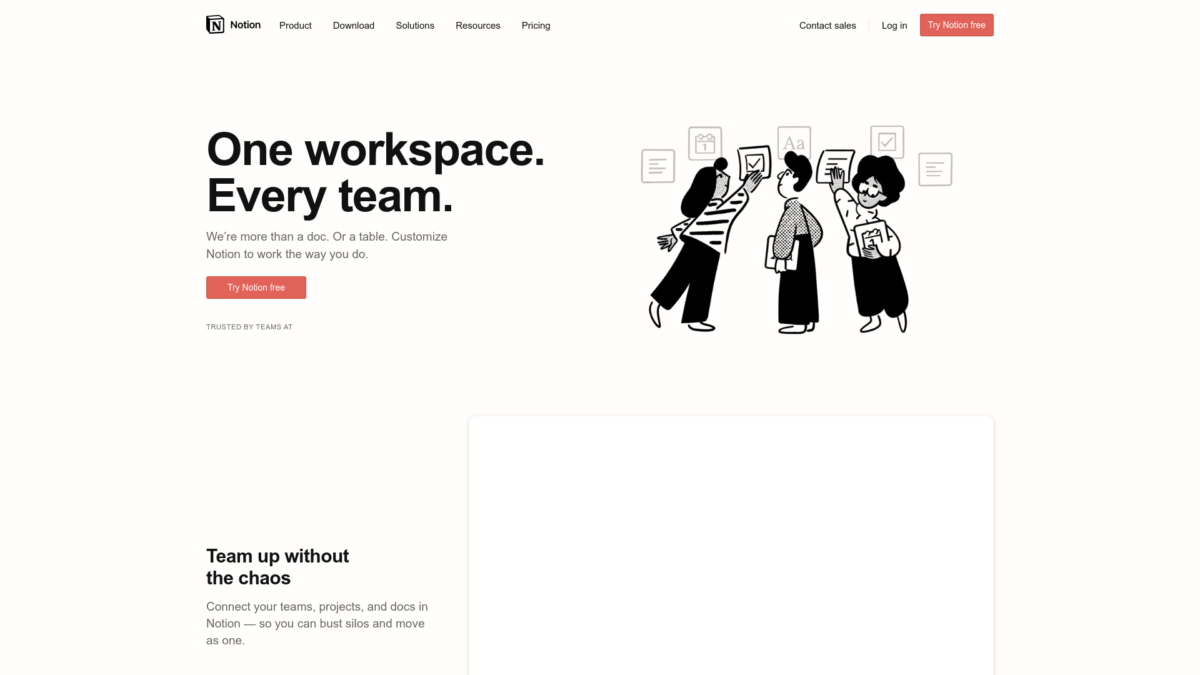
Notion is one of our favorite tools. It’s a great tool to help with task management, documents, and projects- especially for no code desks like us.
Another handy feature is its helpful approach when you have too many notes from different sources. You can have simple access to all your notes without having to deal with loads of clutter. It was originally built just as a task manager but it can be used for note taking, design and marketing teams that need to share files, spreadsheets or databases between multiple individuals within their departments as well as creating products like this cool UX Hunting Kit recently created by the team here.
Notion is a one stop solution for everything! And we mean everything – it even has a feature for making spreadsheets and databases. You can collect resources, and organize business proposals, mind maps, blog posts, you name it! What’s more is that literally anything can be used with the platform: such as video clips and pictures; PDFs, sticky notes and even image files and documents. Told you NOTION’s the real deal.
9. Bubble
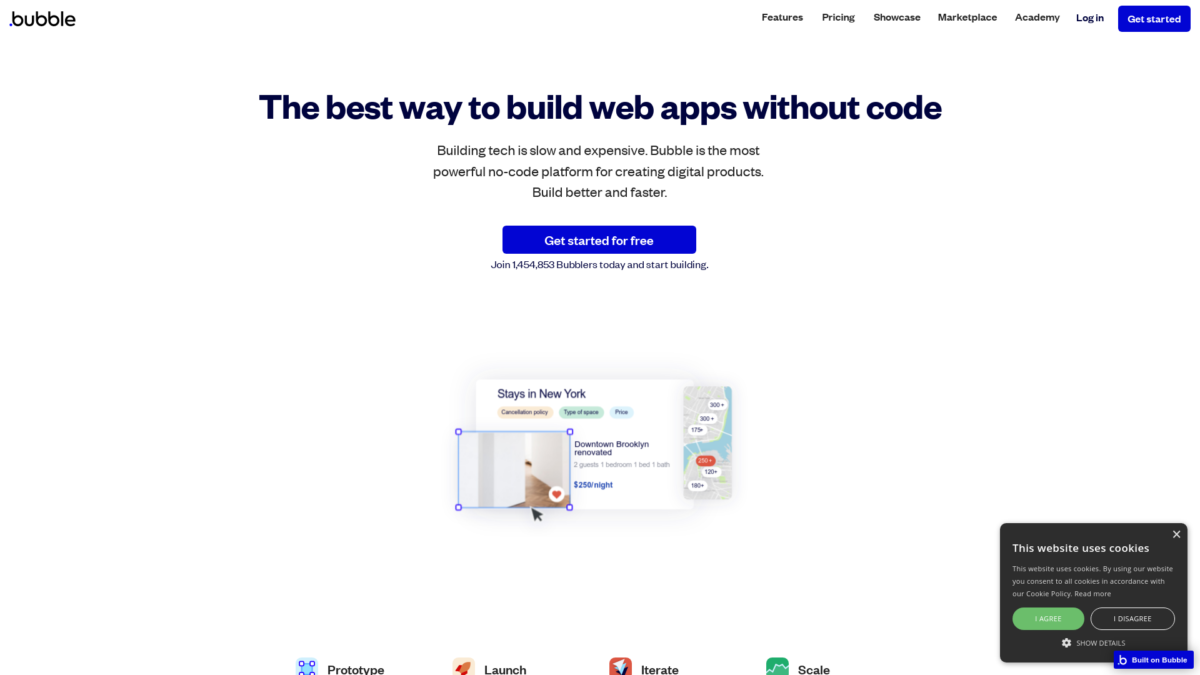
If coding is an area you’re floundering in, then you’ll love using Bubble – a new app designed for helping to create applications without needing any prior coding knowledge. The easy-to-use interface makes creating your own applications a breeze! Users can build complex projects without having ever written a line of code and even handle multiple languages seamlessly.
If coding isn’t your strong suit, don’t fret because Bubble has you covered. Bubble is designed to make it possible for users to have the capability to create impressive apps regardless of whether they know how to code or not. One main perk of using this platform is being able to build complex applications with multiple functionalities without needing a pure understanding of any coding lingo or even having to learn how to code at all.
A drag-and-drop interface will help you get your website built and launched with little to no coding experience. It is a great option for anyone who has wanted to build a website for their startup idea but has been daunted by the high costs of development or just want something to be built fast.
Why I personally love Bubble:
Bubble is super powerful, intuitive and robust. Their support team are super responsive, the interface is easy to use, and there’s a template library with numerous designs that can be easily customised and added features.
10. Zapier
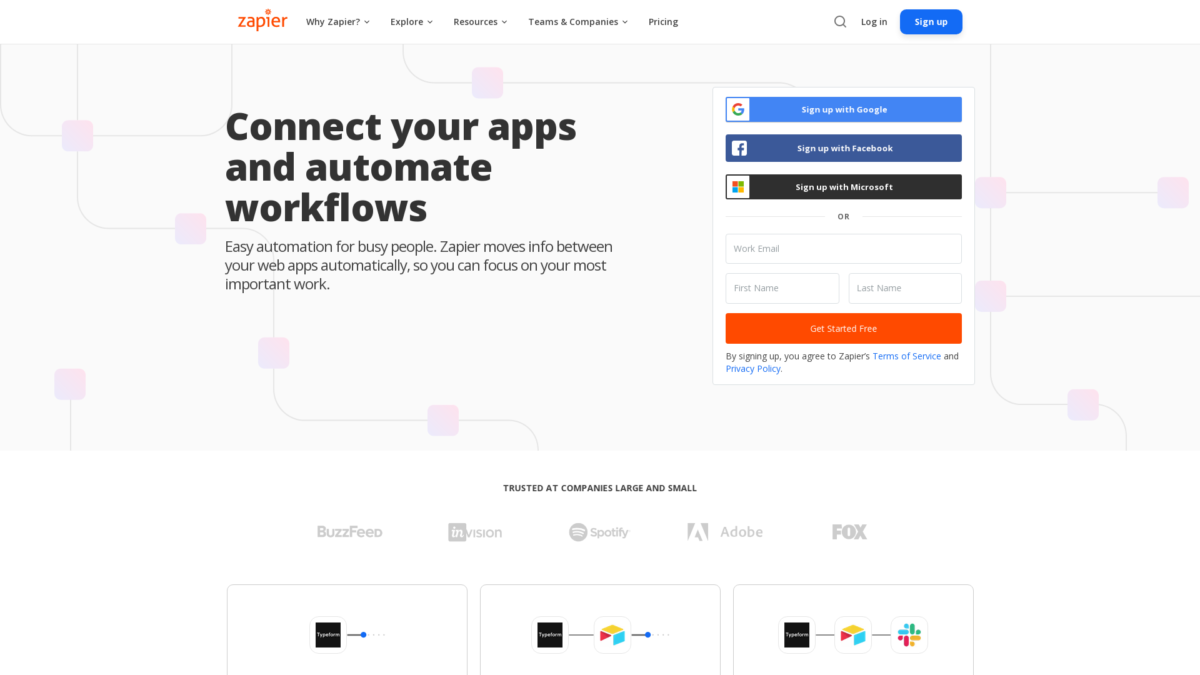
Zapier has many capabilities that people aren’t aware of, but could be helpful. One of the best things about Zapier is that users can integrate various web apps and services all together via their dashboard, saving a lot of time for people who use the tools frequently.
By taking advantage of Zapier’s features on top of what your usual web-based tools already offer, you willl observe that its much easier to increase productivity and get more done in less time because there’s no need to use complex code; all you need is one simple tool which offers a complete set of features bundled into one convenient dashboard for more intuitive automation across the web. Available for free, anyone can take advantage of this nifty tool to help streamline their workflows at home or in business – with lots to look forward to because new integrations are being regularly added by Zapier staff every month!
Zapier is a cloud-based automation tool that enables you to connect different business software and apps. Products can be linked together easily through an automated process (or “Zap”) that triggers when something specific happens in one app (e.g., whenever someone posts a new blog post, Zapier will automatically create a new lead for you in your Google Sheets spreadsheet). With 700+ integrated apps, there are over 10 trillion possible Zaps!
11. Mailchimp
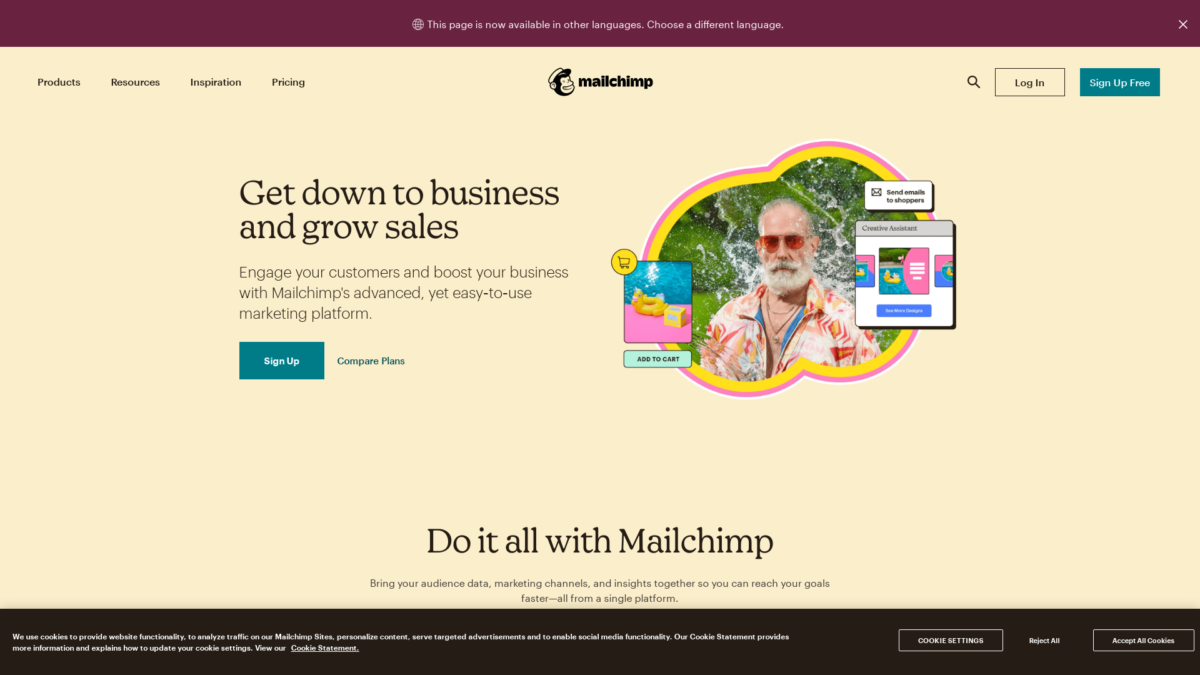
Mailchimp is an email marketing platform that has become a household name. Did you know that you can use their service not only to send out emails, but also to create high-converting landing pages? Mailchimp helps anyone launch and grow their business with stunning, customizable templates and powerful automation features. Whether it’s as a blogger, event organizer or an eCommerce store owner, a simple platform will do the trick! It even comes fully mobile responsive and integrates beautifully with WordPress!
Since the beginning MailChimp has had software integrations, offering apps like PayPal and Zendesk. Most Mailchimp plans start at $10 per month plus $0.10 per subscriber/per month if your list is under 2,000 subscribers . The best part about Mailchimp is how fast it is to set up a campaign and use their tools!
No-code integration
Faster processes
12. Bug Reporting
![]()
Bug Reporting is an excellent tool for collecting customer data such as bug reports, if you’re looking for a reliable way to automate communication between users and developers. As part of the Bug Reporting process, both parties will receive clear, helpful communications without having to navigate complex web forms. Our software also features a dedicated project manager dashboard that shows at-a-glance details about an ongoing project – important info that allows you to visually track status and conclude tasks with ease!
There’s a further level of personalization that we can implement, too: in addition to seeing your customers moving through the funnel, what they’re looking at and interacting with, we can also see how they experience part of it beforehand, such as the checkout process or their progress after signing up so that we fully understand what they are looking for and where exactly they feel stuck. This gives us great insight into where our product is failing them (or succeeding, but there’s always room for improvement!) and where people aren’t quite following through with whatever action has been designed.
Great software should automate certain processes so that team members don’t get overwhelmed by the amount of work that needs to be done on a day-to-day basis. On the subject of bug reporting, Bug Reporting aim is to reduce time spent on manual testing and streamline the process of reporting bugs. It also saves hours worth of time but also frees up resources for more important tasks as opposed to having people manually checking each report they get in.
13. Glide
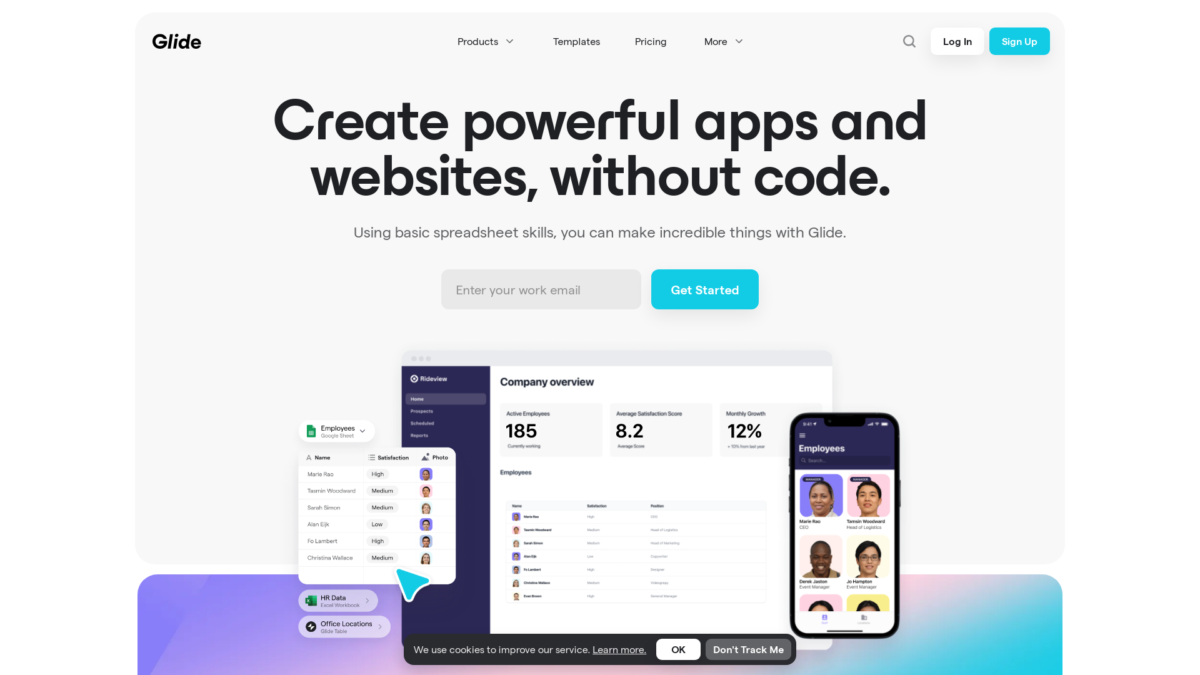
If you’ve ever found yourself wishing you could build an app in a short amount of time, then Glide may be able to help you out. The process is relatively simple…and it can even be made completely free! All you have to do is utilize already existing sheets that others on Glide typically use as a guide. It’s incredibly useful if you’re interested in creating an application for yourself or for a client. Simply follow the guidelines and your clear to go!
Simply take a blank Google Sheets doc, insert the Glide code snippet, and you’re off to the races! Best of all, it’s free until you need more advanced features.
There are many reasons why Glide is the best way to send photos to your friends and family. It’s free, it saves you time and money, and even if you don’t want to be tech savvy, with their simple interface it’s still the easiest way for you to share!
14. Substack
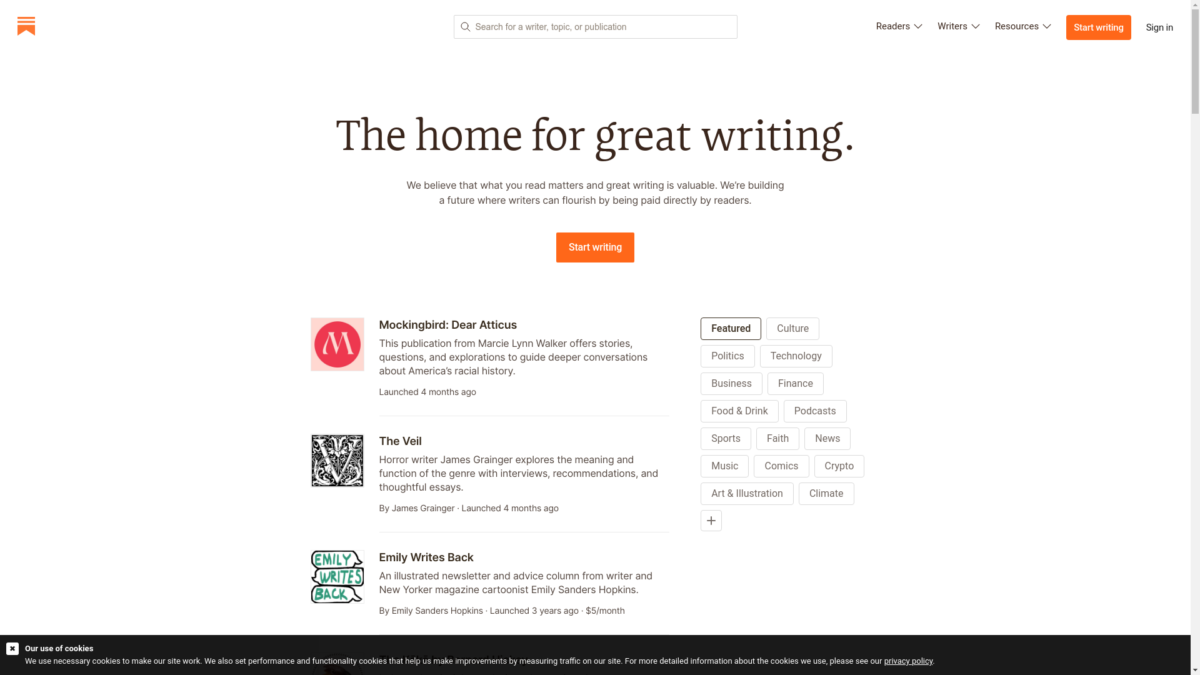
As a writer you will want to learn more about Substack. This is basically a tool that allows ease of creating newsletters with minimal effort. With Substack, you can monetise your content in a seamless manner so you can now focus your full attention again on what truly matters the most – coming up with new ideas and thinking of ways to be creative!
Substack gives you the chance to build a paid email service through which your customers can receive newsletters that you send them. Substack is growing fast and has also heard nothing but incredible things.
So if you’re interested in building an email-based newsletter business, Substack would definitely be one of the best platforms to build with.
Why we like Substack:
Substack is the best tool out there to get a website off the ground. Launching a website takes time and effort, but many tools on the market leave it up to you to research your audience and create and design your own content, which can be intimidating for someone who may not have much experience in web design or online business. With Substack you can set up your own platform to focus on building your content.
15. Thunkable
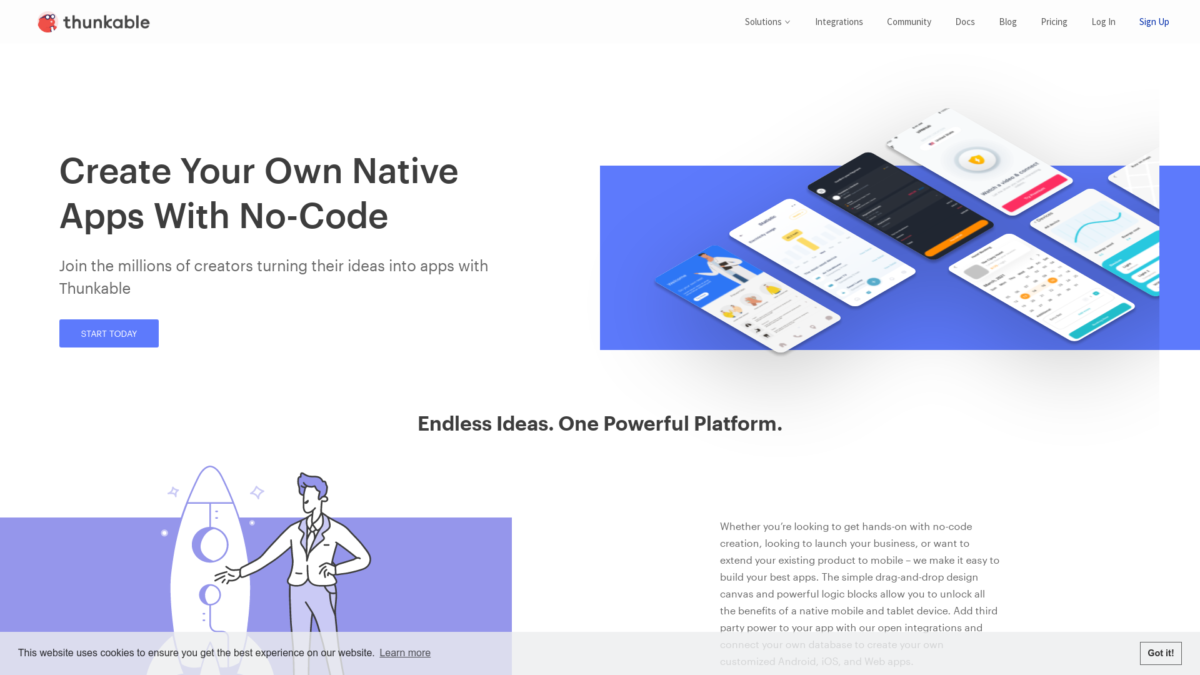
Developing mobile applications requires a lot of planning and the will to execute. In a world where mobile apps have all but replaced other forms of content such as books, audio and video files, and multimedia, it is vital to learn how to develop mobile applications.However, with Thunkable, you can forget about this prerequisite. The tool allows you to create your app by simply dragging and dropping elements – yes, it’s so intuitive that even if you don’t know code or have no experience in software development it still works! So whether an idea strikes as soon as an idea today or tomorrow, users can implement them quickly using Thunkable!
It’s a great tool to have handy, I think it could be very useful in the future. Thanks to this service one could quickly build prototypes or proof of concept versions of their applications and if they want they can share it with other people too.
Why we like Thunkable:
Drag and drop feature
User-friendly interface
Powerful features
Premium features very affordable
16. Buy Me A Coffee
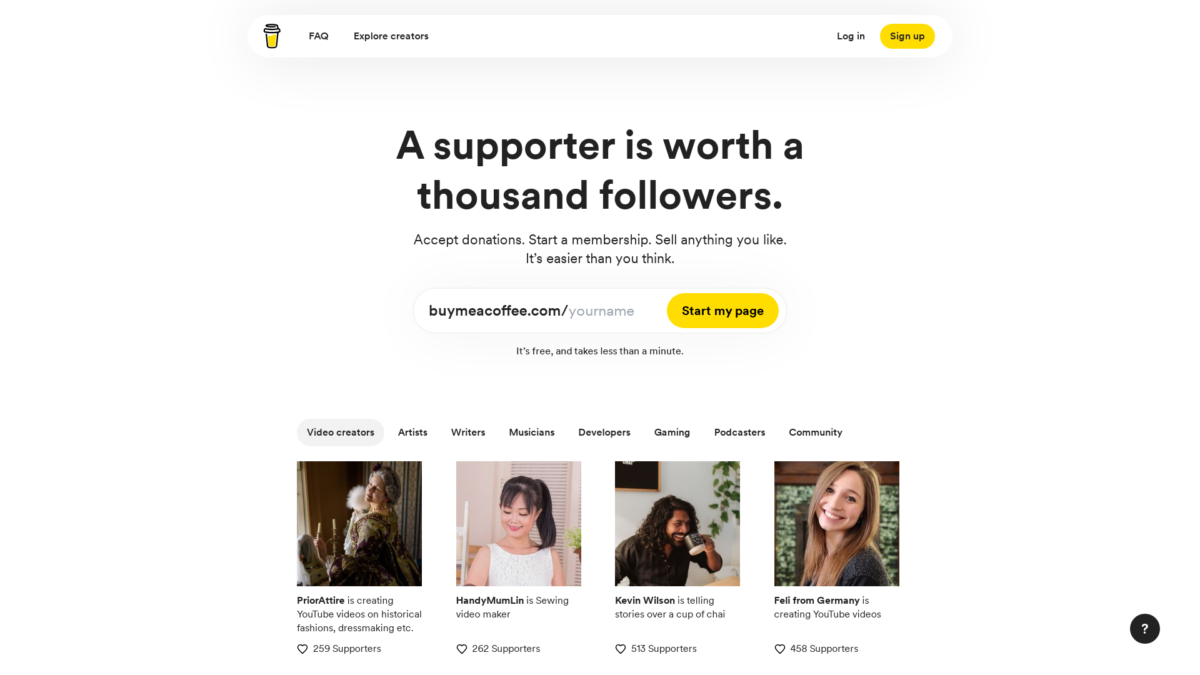
Buy Me a Coffee is a wonderful platform that allows you to create your page with just a few clicks. It’s great when it comes to saving time and keeping page setup simple, so you can spend more time benefiting from the platform rather than working hard on getting things up and running.
For example, on my personal website DANSIE.io I have a “Buy Me a Coffee” button where visitors can donate money through Paypal to buy me a coffee in exchange for getting a call organised with me, as thanks for offering content. It’s a very cool concept that many people have taken off with and because readers of my website love the content and want more insight into things I do, they appreciate and support the idea by buying me a cup of coffee so that we can organise something like an AMA (Ask Me Anything) or interview about maybe why I chose to launch this site and how it ended up becoming what it is today.
Why we like Buy Me a Coffee
This is a great plugin to install on any site, and while it’s amazing that this creator has taken the time to create something so useful for other people, there are more unsettlingly ethical things at play here. For example, if one gets their site installed with the plugin then they get their “donation” button on the site automatically bundled into their content and displayed as a part of it – whether or not anyone wants it. In addition to that, users cannot remove the donation button via the WordPress dashboard and must instead go into… I don’t know how to even say this nicely… a HTML file?
17. Universe
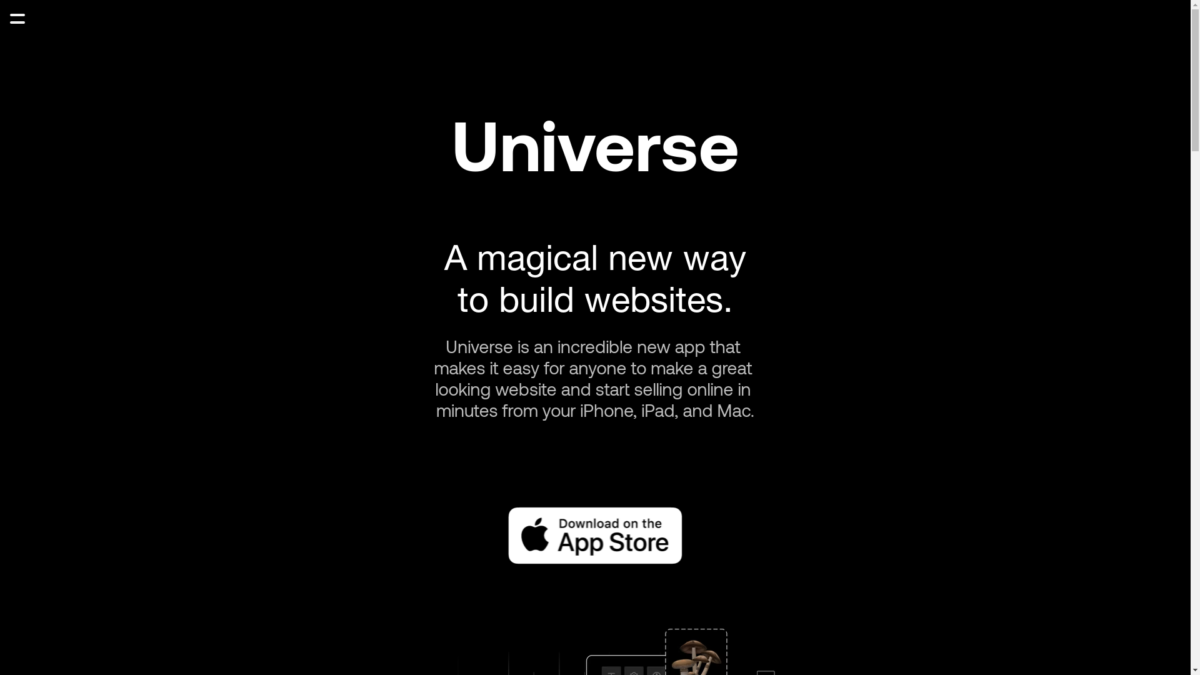
Universe is the online website builder that was built by online store owners, for online store owners. Universe has everything you’d find in a premium eCommerce platform, but with an easier to use interface and a free price tag.
For example, if you want to create your TeeSpring or Shopify store in minutes and this think will be ready instantly! Or if you have already an existing Shopify or Big Commerce Store you can import it into Universe and start selling your products without any additional hassle!
The universe is a neat place. If you’re using it to describe web hosting then we think that Universe is just right because they’ve got so much space on offer and the ability to create anything online without limit, like a clothing store or even T-shirt design website. They’ll take care of everything you need and then add some more by offering online stores with responsive themes and simple pricing too!
Why we like Universe
Fast development
No experience in programming languages needed
Keeps things simple
Great for creators who use social media
18. Voiceflow
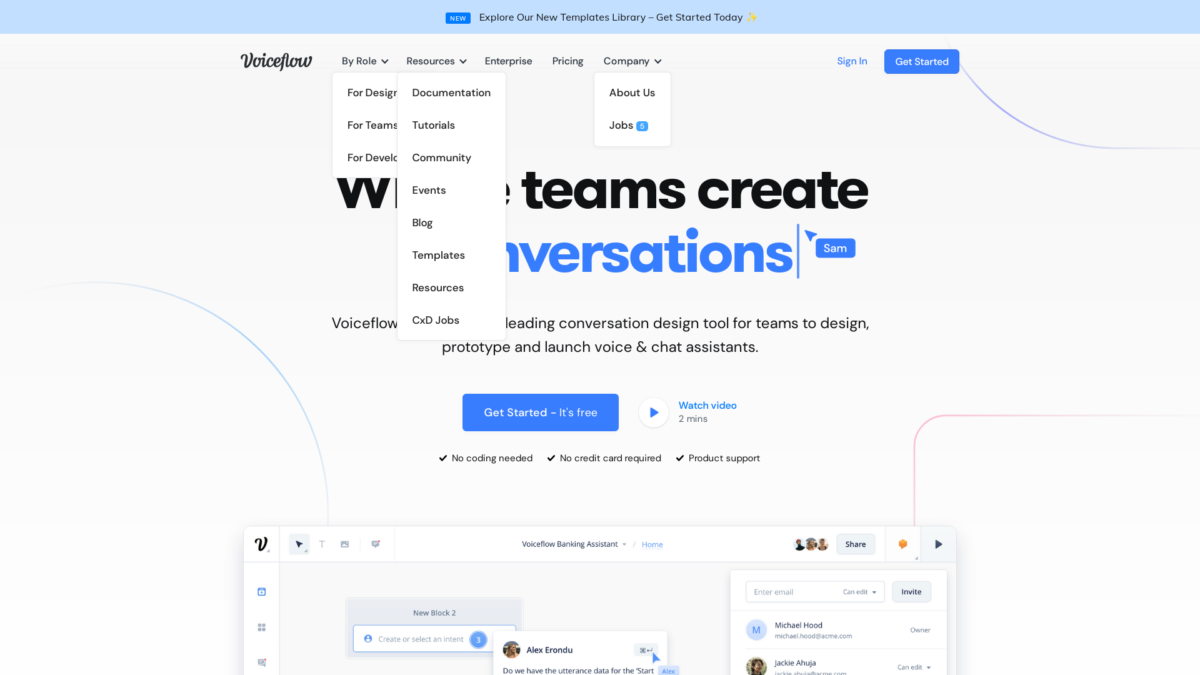
Even though an application is primarily text, voice technology has been becoming more popular through various applications and devices. Voiceflow can help you create voice apps for Amazon Alexa and Google Assistant, which then makes them available to everyone.
The service is so easy-to-use — allowing users simply to drag-and-drop boxes which help users build voice applications very quickly. You do not need a complex coding background in order to make professional sounding applications with Voiceflow .
Why we like Voiceflow:
The Voiceflow platform is a powerful tool for voice app creators that has an intuitive user interface, allowing anyone to create high-quality voice experiences.
19. Squarespace

Squarespace has a powerful library filled with beautifully designed templates designed for your business or product. These templates can be edited in just a few minutes and give your project a nice refined look that doesn’t take too much time to build but is still on the higher end of quality overall!
Why we like Squarespace:
Countless services/integrations
Affordable pricing
Beautiful library of templates
Very simple tp use
20. Carrd
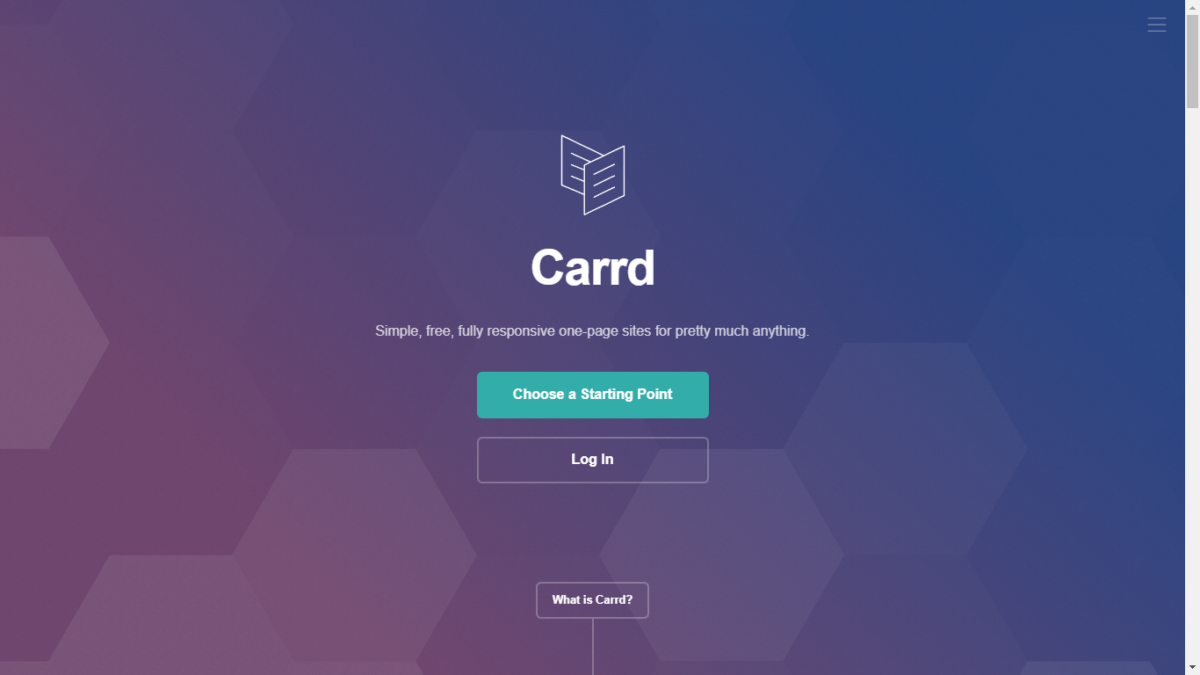
We love Carrd here at Cenario for its clean, minimalistic design and ease of use. If you’re looking to create a one page site, this tool allows you to do so with ease in a matter of minutes using drag & drop functionality. The best part is that it’s simple user interface allows clients to easily customise an existing template or create bespoke single page sites without having any prior experience.
Why we like Carrd:
Cost-effective
Exciting templates
Fast and easy to build sites
CONCLUSION
Because we’re a team that’s all about creation, we always have a long list of what we want to build in the coming weeks and months. We’re extremely excited about the future of our company, so today I’ve written an article to discuss what tools would be best to use when building these projects.
What do you think?
